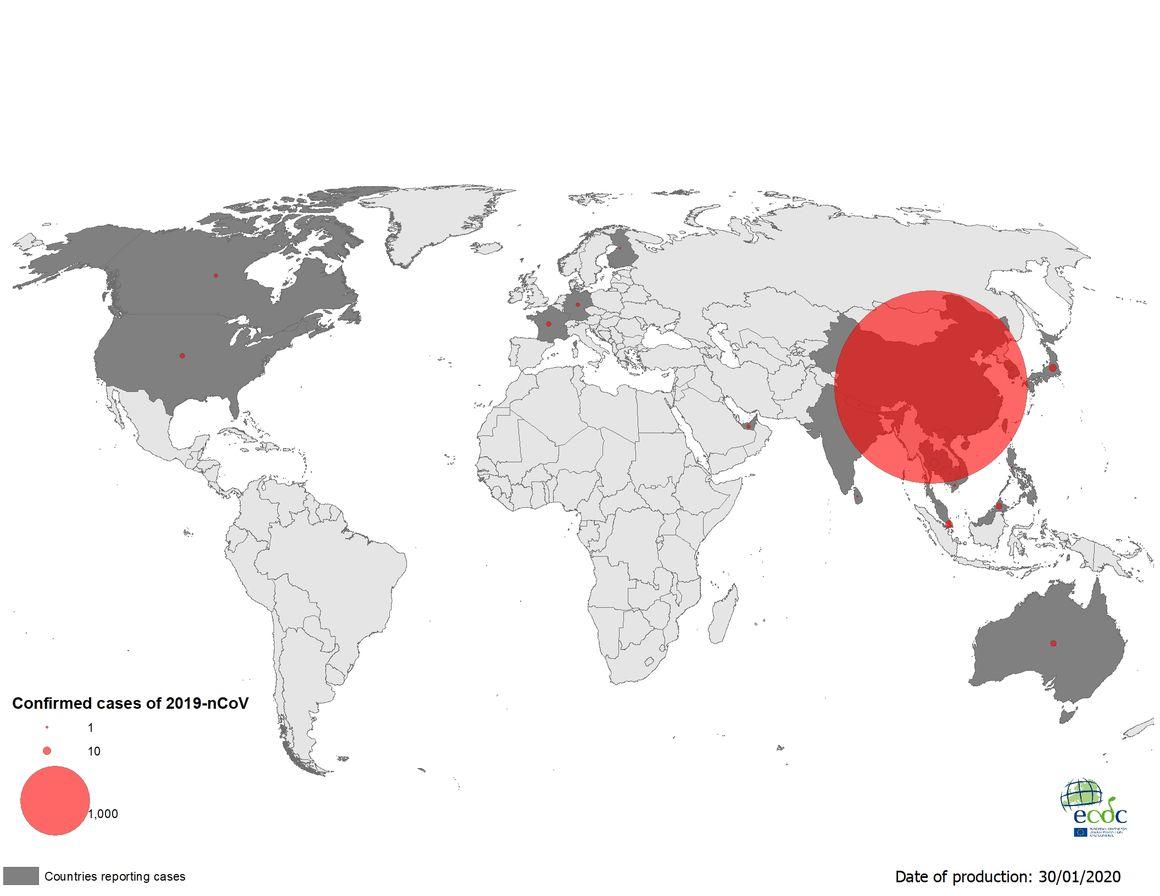More Airlines Cut Chinese Routes As Coronavirus Threat Grows

An increasing number of airlines across the world are making major operational changes in response to the effects of the rapidly spreading novel coronavirus (2019-nCoV) outbreak that began in Wuhan, China.
The range of airline reactions varies widely. Some are canceling all flights to China, while others are only stopping flights to the part of the country most affected. In some cases, the changes are for public health reasons, and in others the capacity reductions reflect plummeting demand as people cancel travel plans. Further airlines are considering making route adjustments and are likely to announce changes soon.
Among the changes announced Jan. 30, Korean Air has suspended four Chinese routes from Seoul, one from Jeju and two from Busan. Frequencies will be reduced on five other Korean Air Chinese routes. These changes will take effect Feb. 2. Korean Air had already suspended its Seoul-Wuhan route until Jan. 31 and has now extended this until Mar. 27.
Korean Air is also making changes to inflight services, such as switching to disposable cutlery on Chinese routes, and curtailing distribution of pillows and blankets. Measures for staff include recommending cabin crew wear masks and plastic gloves on all routes, and canceling crew layovers in Kunming and Guangzhou in China.
Other airlines are taking similar steps for inflight services, and several are waiving fees for those changing travel plans to China.
Japan Airlines (JAL) and Thai Airways continue to operate their Chinese flights for now. JAL does not have a flight to Wuhan but is believed to be evaluating its flights to other Chinese cities. The airline has directed cabin crew to wear face masks on international and domestic flights. All Nippon Airways (ANA) has suspended its Wuhan flight, but as of now has not taken similar steps with its other China flights.
Lufthansa, Austrian Airlines and Swiss International Air Lines are among the latest carriers to stop all flights to China, following British Airways and Lion Air, among others.
On Jan. 30, Air France announced it will suspend all scheduled flights to and from mainland China until Feb. 9. Air France, which previously suspended flights to and from Wuhan Jan. 22, said the suspension remains in effect until further notice.
Russia’s Ural Airlines has stopped flights from its base at Yekaterinburg International Airport to Munich, Paris and Rome, as well as its Vladivostok-Sapporo flight, the carrier said Jan. 29. The routes, Ural said, were popular with travel groups from China, and the carrier was compelled to cancel them after the Chinese government banned international group travel from Jan. 27. Ural has suspended four of its routes to China but continues to operate flights to Beijing and Harbin.
Other Russian airlines have also made changes. Azur Air suspended flights from seven cities to the Chinese resort city Sanya, and Yakutia Airline stopped a Sanya route. S7 Airlines and Aeroflot have not announced any flight suspensions yet.
In the U.S., American Airlines, Delta Air Lines and United Airlines have all moved to temporarily suspend some flying to China and Hong Kong, each citing declining demand as a result of the coronavirus.
On Jan. 30, United announced a “second phase” of temporary reductions that would extend from Feb. 9 through Mar. 28, after previously cancelling flights from Feb. 1 through Feb. 9. The extension will reduce daily departures from the U.S. to China and Hong Kong from 12 departures to four, encompassing an additional 332 roundtrip cancellations. United will continue operating daily flights from San Francisco to Beijing, Shanghai and Hong Kong to allow customers to continue traveling between the two countries.
American will suspend flights between Los Angeles and Shanghai and Beijing, effective Feb. 9 through Mar. 27, although it will continue flying to both destinations from its Dallas/Fort Worth hub, in addition to maintaining operations to Hong Kong from both Dallas and Los Angeles.
Delta, which currently operates 42 weekly flights between the U.S. and China, will reduce its schedule to approximately 21 weekly flights, offering three to four flights on routes connecting Beijing with Detroit and Seattle; and on routes connecting Shanghai with Atlanta, Detroit, Los Angeles and Seattle. Delta said on its website the changes will be effective from Feb. 6 through Apr. 30.
Elsewhere in North America, Air Canada will suspend all direct flights to Beijing and Shanghai from Jan. 30 until Feb. 29, following the Canadian government’s advisory to avoid non-essential travel to mainland China. The Canadian flag carrier currently operates direct flights to Beijing and Shanghai from Toronto, Montreal and Vancouver.
Meanwhile, multiple countries are continuing to conduct special evacuation flights for their citizens trapped in Chinese cities subject to quarantine.
France’s health minister Agnès Buzyn said Jan. 29 that a flight will leave for Wuhan to bring back around 200 French citizens. They will arrive back in France on Jan. 31 and will be quarantined for 14 days. The aircraft is a military A340 and is also carrying a team of about 20 medical professionals.
South Korea has joined the list of countries sending evacuation flights to Wuhan, with Korean Air dispatching a Boeing 747-400 for this purpose.
Some state and national governments are considering stopping flights from China. The Malaysian state of Sabah has announced that it will ban all scheduled and charter flights from China with immediate effect. The primary airport in Sabah is Kota Kinabalu International Airport, with AirAsia, China Southern, Malaysia Airlines, Malindo Air and XiamenAir operating flights from there to mainland China.
“Although this suspension will have repercussions on the state’s tourism industry, the government is seriously concerned about the health and welfare of Sabahans, and we want to avoid the risk of exposing our people to any possible carrier of the novel coronavirus infection,” deputy chief minister Christina Liew said in a press conference.








